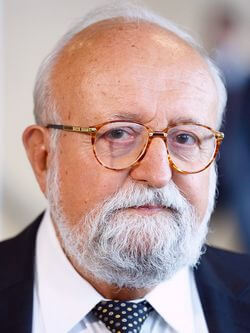
Krzysztof Eugeniusz Penderecki (Polish: [ˈkʂɨʂtɔf pɛndɛˈrɛt͡skʲi] ; 23 November 1933 – 29 March 2020) was a Polish composer and conductor. His best-known works include Threnody to the Victims of Hiroshima, Symphony No. 3, his St Luke Passion, Polish Requiem, Anaklasis and Utrenja. His oeuvre includes four operas, eight symphonies and other orchestral pieces, a variety of instrumental concertos, choral settings of mainly religious texts, as well as chamber and instrumental works.
Born in Dębica, Penderecki studied music at Jagiellonian University and the Academy of Music in Kraków. After graduating from the academy, he became a teacher there and began his career as a composer in 1959 during the Warsaw Autumn festival. His Threnody to the Victims of Hiroshima for string orchestra and the choral work St. Luke Passion have received popular acclaim. His first opera, The Devils of Loudun, was not immediately successful. In the mid-1970s, Penderecki became a professor at the Yale School of Music. From the mid-1970s his composition style changed, with his first violin concerto focusing on the semitone and the tritone. His choral work Polish Requiem was written in the 1980s and expanded in 1993 and 2005.
Penderecki won many prestigious awards, including the Prix Italia in 1967 and 1968; the Wihuri Sibelius Prize of 1983; four Grammy Awards in 1987, 1998 (twice), and 2017; the Wolf Prize in Arts in 1987; and the University of Louisville Grawemeyer Award for Music Composition in 1992. In 2012, Sean Michaels of The Guardian called him "arguably Poland's greatest living composer". In 2020 the composer's Alma Mater, the Academy of Music in Kraków, was named after Krzysztof Penderecki.
Source : Wikipedia